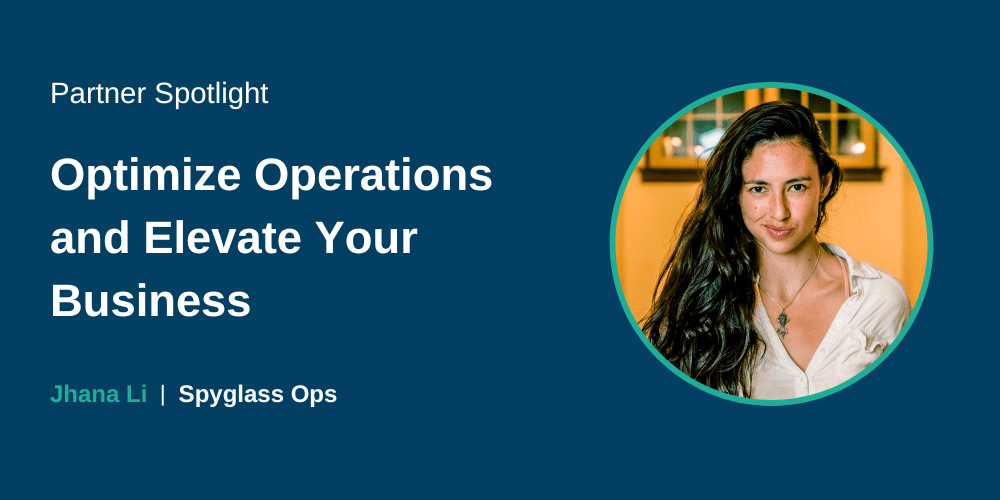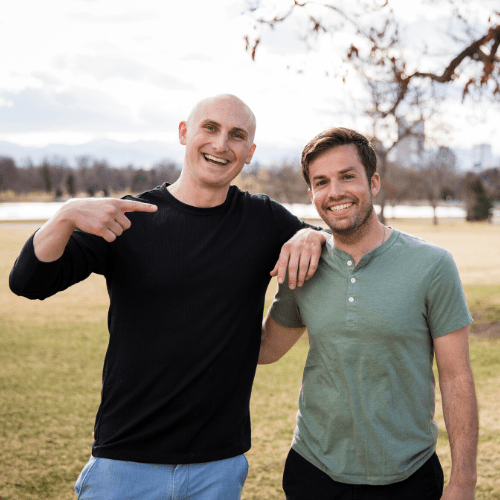Hey, thanks for tuning in to another Partner Spotlight interview at OutsourceSchool.
My name is Connor Gillivan. I’m the CMO and an Owner of Outsource School.
We’re on a mission to help 10,000+ business owners master hiring virtual assistants and freelancers, and industry partnerships is a big way that we’re able to make it happen.
We’re all about creating win-win partnerships where we are able to grow with other companies in the eCommerce, agency, SAAS, and online space.

In this exclusive interview, we have a conversation with Jhana Li from Spyglass Ops.
Jhana Li first discovered Operations while Vanlifing her way through North & South America. Since then, she’s been COO at 2 successful startups, consulted over forty 7- & 8- figure businesses, and coached hundreds more. After seeing countless founders stall out & trap themselves without the proper Operations, Jhana decided to start her own company, Spyglass Ops. Through Operations consulting, recruitment, and training, Spyglass Ops empowers founders to simultaneously scale their businesses while regaining their personal freedom.
 Connor: Hey Jhana, thanks for taking the time to chat with us here. We love getting to know our partners better so that our community can benefit from what our partners are offering and doing in the industry. To get started, can you give us a high-level overview of Spyglass Ops and how it got started?
Connor: Hey Jhana, thanks for taking the time to chat with us here. We love getting to know our partners better so that our community can benefit from what our partners are offering and doing in the industry. To get started, can you give us a high-level overview of Spyglass Ops and how it got started?
 Jhana: So my background is as a COO and head of operations for different startups. I was originally the COO for a seven-figure marketing agency.
Jhana: So my background is as a COO and head of operations for different startups. I was originally the COO for a seven-figure marketing agency.
I then became COO and head operations coach for a coaching program that had hundreds of digital businesses in it. And so as the coach there, I was able to peek behind the curtain of hundreds of businesses and gather a ton of data very, very, quickly about what makes businesses successful when it comes to starting up and scaling.
After seeing that hundreds of times, I actually developed an understanding and I saw the patterns about what the best practices are, what actually works, what the core foundations are and what are the common pitfalls that systematically and regularly trap small business owners or end up flatlining and losing their businesses.
After enough time of seeing that data, I ultimately decided to start my own business. First, as an operations consultant, and now — doing what I do now — which is operations coaching.
I’ve taken all of that information and all of the best practices that I learned over the years, and I’ve put that into a unique operational methodology that I know teach operators so that they can turn around they could scale up the businesses that they serve, they can avoid the common pitfalls, we can build the patterns for success and ultimately, scale the CEO out of the day-to-day while scaling the business.
 Connor: Jumping off of that…if there was one problem you’d say that Spyglass Ops solves best for your clients, what would it be? Why?
Connor: Jumping off of that…if there was one problem you’d say that Spyglass Ops solves best for your clients, what would it be? Why?
 Jhana: The problem that I solve for my clients is for the CEOs that ask themselves the questions:
Jhana: The problem that I solve for my clients is for the CEOs that ask themselves the questions:
I don’t know how to scale my company to the next level.
I don’t know how to scale myself out of the beach and out of the day-to-day as that happens.
Why’s the company no longer growing? How do I get it to this next stage of growth?
The mechanism with products and services that we need to do that are two.
Number one, we have to clarify your data. You have to clarify where you want this business to go. We also need to clarify what you want your relationship with your business to look like at scale. How hard are you working? How flexible and free is your schedule?
We have to come to understand not just the rules for the business, but the business owner. And then based off of that in our ops inspection. This is a week long company wide audit. We take those goals and we reverse engineer exactly step by step what it is going to take to get you to those goals — personal and professional — across the entire business.
We do a full blown audit: we look at every system, we interview team members, we interview you. Everything. And we come back with a 12-month roadmap that maps out:
Here’s exactly what bottlenecks are live in your business.
Here’s exactly why they’re happening
Here’s exactly how they’re stalling out your growth
Here’s exactly what you need to do to solve those problems to accomplish ,again, your personal and your professional goals 12 months from now.
So that’s our ops inspection.
On the back end of that, most often, we will arrive at that report of findings call with our CEO and be like look, you have an amazing operator on your team. Either you know they’re an operator and they’re in an ops role, or you had no idea. You’re an account manager there. You’re an executive assistant or project manager, but they’ve got amazing operational ability. And instead of having to go out and incur another really high-ticket salary, we could just train that person up so they can eventually elevate and step into the ops role.
And so on the back end that is really our core offer, which is our operations coaching programs. We have two programs: Ops Academy and our COO Academy.
Ops Academy is a three-month boot camp to train up ops managers. COO Academy is a six-month boot camp, and that’s to train up heads of operations and COOs.
So think of it as like our ops one-on-one versus our advanced ops program. But either way, what we’re doing is we’re taking your operator and we’re giving them all the tactical skills, knowledge, tools, mentorship, community, everything they could possibly need to level up into the operator that your business needs and they can, in real time, learn something in a program, turn around, execute it in your business, and help you scale up.
 Connor: As the company continues to grow over the next year, what are your plans for expansion? Any new products or offerings or enhancements to your current products?
Connor: As the company continues to grow over the next year, what are your plans for expansion? Any new products or offerings or enhancements to your current products?
 Jhana: So we are really focused on, first-off, continuing always to improve our products and making sure that they are absolutely the best in the business. And number two, really scaling up our acquisition which is not something that I had put a lot of energy and effort behind. And we are now in the process of really dialing in scaling an organic marketing and sales machine. And so that is our primary focus right now and that is naturally going to scale the revenue of the business. We have not anywhere near reached the max capacity that we have with the products and services that we currently offer.
Jhana: So we are really focused on, first-off, continuing always to improve our products and making sure that they are absolutely the best in the business. And number two, really scaling up our acquisition which is not something that I had put a lot of energy and effort behind. And we are now in the process of really dialing in scaling an organic marketing and sales machine. And so that is our primary focus right now and that is naturally going to scale the revenue of the business. We have not anywhere near reached the max capacity that we have with the products and services that we currently offer.
Secondarily to that, closer to the end of the year, we’re also going to be expanding our product line and specifically creating more coaching programs for the CEO. Right now, 100% of our programs are for operators but the reality is that the CEO has a lot of leveling up and learning to do as well if they are going to effectively scale themselves and their business.
We don’t really offer that coaching right now. So that is a product that will be coming soon. More community, more mentorship, more support for the CEO so that we can both train them and their operator at the same time and really transform that power couple into what it needs to be for the company to ultimately scale up and transform.
 Connor: And how specifically would you say that Spyglass Ops and your team is different from other operations management businesses in the industry?
Connor: And how specifically would you say that Spyglass Ops and your team is different from other operations management businesses in the industry?
 Jhana: Two things.
Jhana: Two things.
Number one — we start with a fully customized gameplan, and we are not done-for-you.
So both of those things together is a unique concept. There’s a lot of ops programs/offerings out there that will be done-for-you systems.
The problem with that is that if you plug in somebody else’s templates into your company, they very rarely get used. They’re one-size-fits-all, they’re not the right fit for your team. Your team ends up like you pay a lot of money for them, then your team never uses them.
That’s option number one.
Option number two — we are fully, fully customized. Our team will come in and build out your systems but it is super freakin’ expensive and at the end of the day, now you have this dependency on this external operational team that you don’t control and that you didn’t hire to build out your systems and there is not really a clean handoff towards an operational infrastructure that you ultimately own, know how to use, and have somebody in-house who’s responsible for it.
We strike the balance between those two.
We are absolutely customized. That’s what we do in the ops inspection, it’s that we go directly into your business, we look at absolutely everything and we get to know your company and exactly what operational needs you have.
But then on the back end, we’re going to work through your team. We’re going to put your operator in our program so that I have the customized knowledge of what the business needs and I can give exactly the right custom answers to your operator as they are, real-time, implementing that within the business, as well as all of the best practices, the templates, the tools, everything they may possibly need to be need to be successful.
So we’re ultimately a done-with-you program because it’s really your operator who’s learning the skills and implementing that within your business.
But! That keeps it cheaper and we’re still able to make it fully customized because we start with the ops inspection. So that would be the number one biggest differentiator.
I would say there would be a second major differentiator between what we do and what others do, which is that almost every other operational program that I’m aware of works with the CEO.
“Here’s how you, CEO, need to level up your ops. Here is how you need to understand operations, your systems, your SOPs, here’s what you’ll need to do to create operations within your business.”
We take the opposite approach, which is there is nothing that you, the CEO, need to do to level up your operations.
We will give that to your operator directly. So it is not taking any time, energy for you as the head of the business to learn how to scale your own operations.
 Connor: What’s your outsourcing story? We find that everyone has a different experience when outsourcing and hiring online. What is your first memory that comes to mind?
Connor: What’s your outsourcing story? We find that everyone has a different experience when outsourcing and hiring online. What is your first memory that comes to mind?
 Jhana: One that comes most to mind is a recent hire that I made for my leadership team.
Jhana: One that comes most to mind is a recent hire that I made for my leadership team.
I was hiring a head-of-product and the candidate that I ended up hiring completely redefined my expectations and my beliefs around what is possible for someone to do in their first 30 days at the job
Within her first 30 days, she had generated a two-year product roadmap of everything she wanted to accomplish with this product. She had entirely rebuilt our existing product so we’re migrating from one product house to another. She completely rebuilt the entire thing, top-to-bottom without me. I hopped on one call a week, a strategic call where she brought in — “Hey, Jhana. Here are the questions that I have for you. Here’s what I need answered.” And then she walked out of that meeting, went out and executed an entire product makeover with my team in the first 30 days on the job. And it was absolutely exceptional.
The product that came out of that was world’s better than anything I could have designed or built myself. Her assimilation into our culture and into our team was frictionless and immediate and fantastic and it all took just the first 30 days on her job. And she had entirely redone my business, which was just incredible.
 Connor: Love it! Talking more about outsourcing, what advice would you give to yourself if you were just about to start outsourcing and hiring online?
Connor: Love it! Talking more about outsourcing, what advice would you give to yourself if you were just about to start outsourcing and hiring online?
 Jhana: the biggest piece of advice I would give is the lesson and the reminder that exceptional people exist everywhere. Literally! They literally exist everywhere.
Jhana: the biggest piece of advice I would give is the lesson and the reminder that exceptional people exist everywhere. Literally! They literally exist everywhere.
Where we as CEOs and business owners need to put our focus is on building the funnel that serves as a magnet and attracts the highest levels of talent.
If we’re going out onto LinkedIn, and Indeed and all these giant talent pools and we’re thinking there’s nobody here there’s nobody looking there’s nobody who isn’t already employed. There’s nobody internationally who I can afford. All of these limiting beliefs I hear all the time. I call bull.
Great people, exceptional people exist everywhere. The question is, do you know how to find them? Do you know how to attract them?
And so if I was just starting out, the advice I would give is put way more focus than you think you need on the hiring process and the hiring funnel. Because with the right process, you can find exceptional people. Skip that step. And you will always be left feeling like they aren’t good enough.
 Connor: How about this one…how do you communicate with the people you hire online? What’s your best practices there and how has it changed over time?
Connor: How about this one…how do you communicate with the people you hire online? What’s your best practices there and how has it changed over time?
 Jhana: I communicate with people online the way I communicate with people in person — as direct, as honest, and as straightforward as possible. I think that holds especially true in a remote environment. When you can’t see somebody face to face, there is a lot of communication that obviously gets lost. There is a lot of nonverbal communication that can happen in an in-person conversation: you can sense little things, energy changes and mood shifts, and it’s harder to pick up on that online.
Jhana: I communicate with people online the way I communicate with people in person — as direct, as honest, and as straightforward as possible. I think that holds especially true in a remote environment. When you can’t see somebody face to face, there is a lot of communication that obviously gets lost. There is a lot of nonverbal communication that can happen in an in-person conversation: you can sense little things, energy changes and mood shifts, and it’s harder to pick up on that online.
The best communication practice that I have found in working in a remote environment is that you have to overcompensate with direct communication because you can’t rely on nonverbal cues as much.
So that leads to a lot of uncomfortable conversations in the remote work environment where you have to say things explicitly that, in-person, maybe you would hope they would just kind of get it. And it’s uncomfortable for you to say that directly and out loud, but you need to in a remote environment, because they’re not going to get it.
You can’t count on them getting it and if they don’t get it that’s not on them. That is not their fault. That is something that we have to take ownership of as communicators to have full ownership to the clarity of explicitness of our message. We have to make sure that they understand it. And until they do that’s still on us. And it means that we kind of communicate it ourselves.
So I always tell my team, it’s part of my onboarding deck, over-communication is the right level of communication. It is so important that people understand straightforward communication. Doesn’t mean I’m attacking you. It doesn’t mean I’m being malicious. It’s just the level of communication that is needed for everything that we have to say to each other as a team to be fully received and understood.
 Connor: As we close this out, I just have one more question. Where is the best place to find and follow you and the company online? Also, if you have one, is there any special offer that you’ll be offering to the community today?
Connor: As we close this out, I just have one more question. Where is the best place to find and follow you and the company online? Also, if you have one, is there any special offer that you’ll be offering to the community today?
 Jhana: They can find me on the Spyglass Ops website. Conversely, they can follow me on Facebook, and specifically where they can get the highest free value from me is going to be my free Facebook group. I go there every single week. I drop masterclasses every week with a hot ops topic for CEOs. So that group is really specifically for visionaries for CEOs who need to understand what operations is, when to bring operations in, etc. So that would be the best place to follow me online so that they can get value.
Jhana: They can find me on the Spyglass Ops website. Conversely, they can follow me on Facebook, and specifically where they can get the highest free value from me is going to be my free Facebook group. I go there every single week. I drop masterclasses every week with a hot ops topic for CEOs. So that group is really specifically for visionaries for CEOs who need to understand what operations is, when to bring operations in, etc. So that would be the best place to follow me online so that they can get value.







